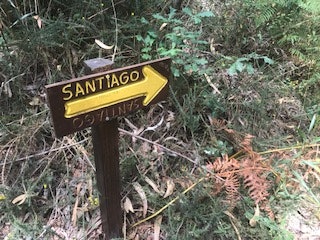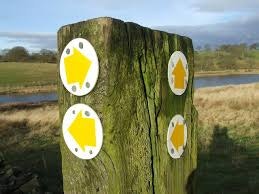Life's Waymarks – Critical signs along our journey
Sitting in the Barcelona airport writing this reflection on the day after the recent terrorist attack, is yet another poignant reminder that one's mortality is not a given. Most significantly, another tragic loss of life is a harsh reminder that we should maximize our opportunities and take note of life's guiding messages. There are many personal and professional philosophical and psychological waymarks put in front of us each and every day; ones which at times we may avoid at our peril.
Having recently completed part of the Camino pilgrimage walk from Espodende Portugal to Santiago Spain, the reliance on waymarks along the path is significant. It is amazing how reliant one becomes throughout the journey on a simple symbol of the shell and/or a yellow arrow painted on lampposts, roads, walls and many other elements; a symbolic reinforcement to give us confidence that we were still on the right path to Santiago. Our vigilance on these waymarks had been even more heightened having missed a sign on day one as result of taking what looked like a short-cut across an intersection. This lead to two extra kilometers and the stress of retracing where we should have been. Just like the Camino, there are rarely such things as short-cuts in life.

Waymarks are not something new. Historically, in the UK for example, travelers of old would need to ask the locals for directions in remote and mountainous areas of the UK. Many winter travelers lost their way, and their lives, as they perished through cold and exposure as a result of getting lost. As time passed, road side markers (Waymarks) were erected, at first composed of simple cairns or heaps of stones, then standing stones as used by the Romans. Today our landscape is littered with waymarks; what we now know as road signs adorn all major and minor routes.
If we choose to rely on these everyday waymarks for travel and direction, including the new world of GPS, which is just an evolution of the waymark, then why is it we ignore personal and professional waymarks when they could be signaling impending problems or even better, future possibilities? I would suggest that we are losing the ability to focus, reflect and slow down enough to take note of even the most basic of life's waymarks.
Author and management consultant, Stephen Covey, uses a simple analogy of the saw to highlight what happens if we do not take time to reset our goals. As the saw becomes blunter, instead of removing the saw and taking time to re-sharpen it, thus returning it to its maximum functionality, we simply keep sawing faster. The severely blunted blade is not as effective, so we try and rationalise a solution through increasing the speed at which we saw. Obviously, at some point this strategy is simply unsustainable; either we continue to re-sharpen ourselves or face the ensuing consequences.

Throughout my 36 years in education, I have witnessed many teachers, students, parents and friends fail to take heed of what on the surface appeared to be clear waymarks worth following, or at the very least taking into consideration.
The ongoing pursuit of material and/or financial success, unfulfilled career aspirations, failing to pursue passion as opposed to pleasing others, remaining in a job for the wrong reasons, making unhealthy comparisons with others, manic pursuit of sporting success, family breakdown, broken relationships, lack of spiritual connection, anxiety, depression, self-harm, basic health warnings, and in general, no attention to personal wellbeing, are all waymarks of life that I have seen ignored, denied or rationalised as not being important or a concern.
Part of the problem could be the manic pursuit of what we term 'success'. For adults, this may be seen as wealth accumulation and for our students, self-worth is increasingly being measured by an exam score or the course one gets into at the 'best' University. Such pressure may then filter down to teachers; as in the recent case of two teachers in very high profile and exclusive British schools, who were dismissed for providing students with advance information about upcoming exams. Why would they do this? Possibly they are using the wrong waymark to measure success their own success and that of their students.
In a recent UK Times article on Wednesday 29 August, entitled 'Hopefully, hard exams will end the A* obsession', it is argued that the decision to provide students with advance information is more than likely because of the pressure to turn students who are not really A* grade, into high achieving individuals, because the parental expectations, like the grades the students are given, are highly inflated. No doubt this parental expectation correlates with the level of fees being paid.
Further pressure may arise from what now appears to be a commonly held view that everyone is extraordinary. I quite often provide new parents with the definition of a gifted student, that is, one percent of the population and 'my son'. As Manson (2017, p60) suggests, 'It has become an accepted part of our culture today to believe that we are all destined to do something extraordinary. Being average has become the new standard of failure'. Make no mistake, I am a great believer that we should extend and stretch ourselves and our students to achieve personal excellence. What we have to understand is that this is very much an individual journey, couched within the unique context of the individual.

If we continue to choose the incorrect waymarks to guide us through life, then we may in fact be benchmarking ourselves against the wrong measures, and in doing we risk being at discord with what we should really be valuing such as family, friends and inner self satisfaction.
I recently listened to a young Oxford musician play his new composition entitled "There is no reset button in life". Failure to take note of the Waymarks that are put in front of us throughout our life's journey, will only go to reaffirm that this song title is correct.
While there may not be a reset button in life, we are still in a position to retune our personal and professional lives at any time. So many times, I have heard people say 'I have no choice'; I can't leave that place or that job. In actual fact, we all have a choice; it is just whether or not we choose to exercise that choice is the defining difference. Blaming others and making excuses are in themselves choices. We must focus on maximizing our intrinsic locus of control as opposed to using an external locus of control as a rod, which we then use to prop up our life.
We can either use the waymarks put in front of us to enhance our internal locus of control, or use them to rationalise why things haven't worked out as we hoped; either way I would argue that we need to take notice of these signs and messages to achieve our full potential.
